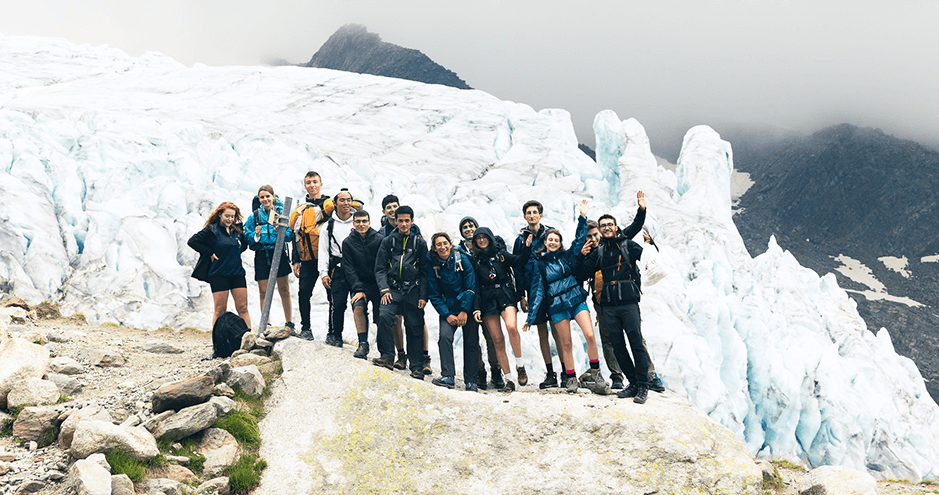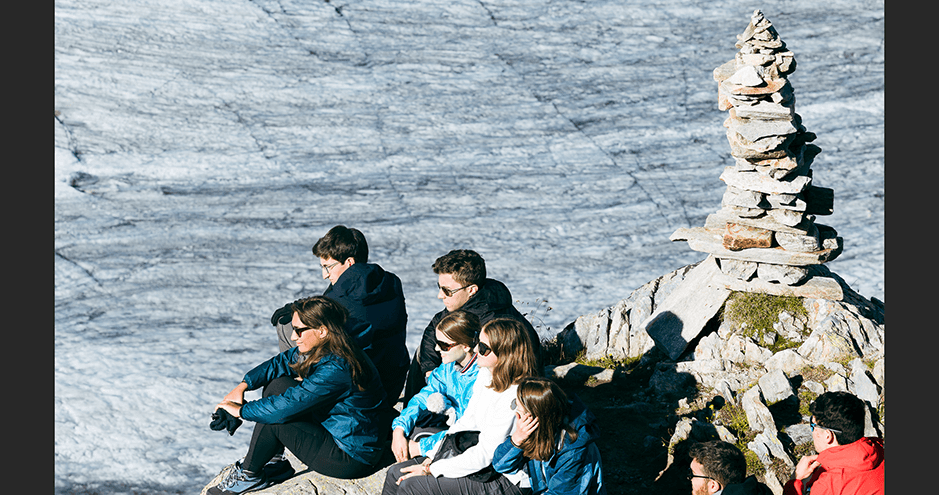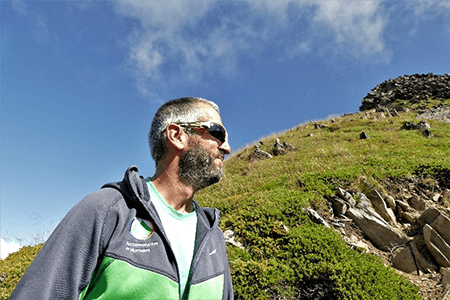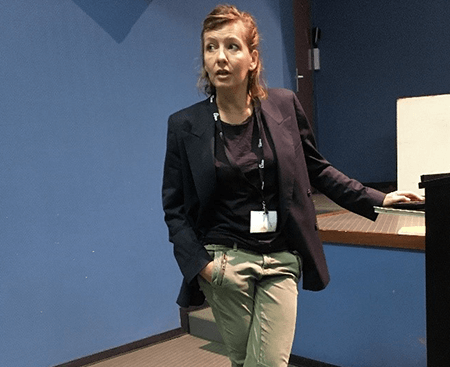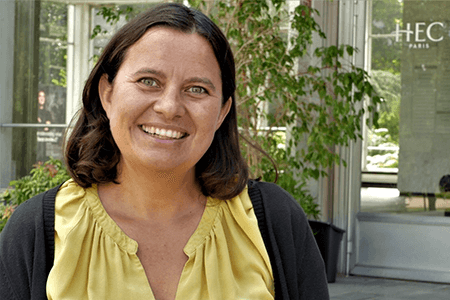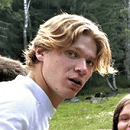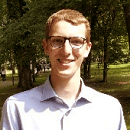HEC Students Experience Purpose and Sustainability in the Alps
For the second time ever, HEC’s first year L3 students began their school career with the off-campus “Purpose & Sustainability” seminar. 370 freshmen converged on the Alpine village of Chamonix for a physically and intellectually intense three-day seminar devoted to the major environmental and social challenges the world faces. How can these impact on the companies’ core purposes and the students’ professional future?
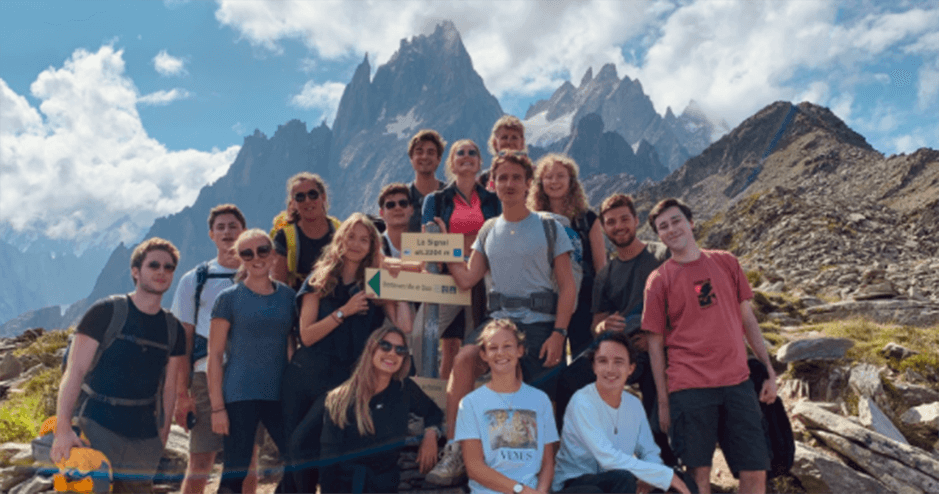
(© Quentin Iglésis - Mountain Path)
“Climb to the highest experience.” The logo on every Chamonix mountain pass for its ski slopes reflects the spirit driving the HEC team that organized the academic year’s opening seminar, Purpose & Sustainability. This seminar is the first step of a course overseen by the school’s Society & Organizations Institute. From freshman to senior, students will enjoy 200 hours of a mandatory class that constitutes 10% of their degree. While most of the business school’s staff went off for a well-earned summer recess, Xavier Boute, Catherine Viglione and Cécile de Lisle were busy guaranteeing that, come August 22, 370 L3 freshmen would embark on an experience they would never forget.
“These three days in the Alps are the first steps in a track which will accompany HEC students throughout their four years with us,” says Cécile de Lisle, the Executive Director of the Purposeful Leadership Chair. “Just six weeks after being accepted into the school, they are invited to reflect on the challenges the world is facing in terms of its ecological transition and global inclusion, the role that companies should play to face those challenges, as well as their own raison d’être in choosing a specific professional path.”
No Camp Holiday
This second off-campus introduction to France’s top business school underlines HEC’s commitment to leadership and sustainability, a mission that it enshrined in its rebranded core values in June. “Leadership is often misunderstood in France,” continues de Lisle. “It means giving the best of oneself to allow others to give the best of themselves. That translates into a leadership for the common good. We’ve chosen Chamonix as a starting point because we wish to gravitate towards that objective together, reaching mountain pinnacles, both physically and metaphysically. In this seminar, we have the students work on three dimensions: being yourself, being together and being for.”
Within 24 hours, the results begin to surface. “I have to be honest, before we came I thought Chamonix would be some kind of camp holiday,” admits L3 student Alexandre Degrave. “But this has been transformative. All the exercises – the mountain hikes, the climbing, the first aid skills – give us lessons in life: how to respond to crises, be agile, be innovative, find strength in numbers. These are tools we can use as managers to react on the frontline in times of crisis.” 19-year-old Nina Boissin feels humbled by both the power and fragility of the immediate environment: “We saw the glacier crack, break, shake the earth below us. It makes us aware of how powerful yet fragile the mountain is. Our guide told us Chamonix never used to experience temperatures of 30°C, now it’s commonplace. It underlines how we must respond fast to an ecological catastrophe.” Parisian student Géraud Baudet looks beyond the three days in the Alps: “Seeing glaciers melt has been a shock to the system. We’ve had our noses in books for the past two years and witnessing the degradation here has thrown us into the real world. That’s why we write a memoir at the end of the two-month Purpose & Sustainability course. It’s a memoir to remember, memorize this experience.”
Balancing Ecology and Business
For the course’s pedagogical director, Xavier Boute, Chamonix is all about thinking out of the box: “We’ve turned our pedagogy on its head. We start with the experiential part, throwing the 370 students into a magnificent landscape for three days and nights. But it’s a landscape which begs questions, provokes surprise and soul-searching. Based on these questions, the students begin their research for 10 weeks which, we hope, will forge their long-term vision. These mountains incarnate beauty - and damage. We hope its physical impact will provoke the freshmen into exploring for answers and forging theories which we hope they’ll transpose into the business world.” Blaise Agresti, is cofounder of Mountain Path and its motto “frugality, engagement, authenticity”. This high-altitude consulting agency is partnering HEC in the seminar. He concurs: “The mountain teaches the students to adopt responsible attitudes, show solidarity, a form of teamwork which has to be sincere and powerful. These freshmen leave here with a hidden gift: a strong inner spirit which they should treasure and use during their professional careers.”
(©HEC Paris - D. Brown)
The students are split up into a dozen groups. We catch up with Group Q as they trudge up to the Albert 1st refuge, led by veteran mountaineer Patrick Duvillard. He describes to a dozen panting students the dangers that weigh on the glaciers before them, pointing to a reservoir in the distance: “If these glaciers disappear, so will that dam, which provides electricity not only for France, but Switzerland too. So, balancing ecology and business is a vital issue you will have to wrestle with when you go into the professional world.” Later, Patrick confides his growing concerns for a world literally melting away before his eyes: “Everyone here is worried. For the past three years, the environment is evoked by every visitor we have to the mountains: how to fight the climate change, what to do with our waste, how to promote renewable energy. The biggest concern for us is the air pollution. The traffic going through these valleys heat everything up, accelerating the meltdown. But it’s a complicated issue to tackle.” Patrick eyes the returning students. “They are our hope. These youth will become the deciders of tomorrow. There’s only so much that citizens can do, it’s the future leaders here who can really move mountains and change the equation.”
Design Fiction for a New Future
(©HEC Paris - D. Brown)
This sentiment is echoed by consultant Anne Gallienne. The students enjoy an inspiring talk from the cofounder of Poprock which, contrary to what its name suggests, is a consultancy helping leaders to drive transformation in their organizations. Gallienne specializes in mountain strategy, and she has no doubt about the turning point the world has reached – and the role the students can play: “You are all going to be greater actors in resolving these challenges than I will,” she tells the 100-or-so students assembled at the Chamonix High Mountain Military School. “You have the keys to answer the growing demand from civil society. Expectations are evolving a lot faster than company strategies and government policies. People are growing frustrated as they see the stakes rise. That’s a feeling of powerlessness that can give way to anger. Their powerlessness is nourished by the conclusions from the latest IPCC (GIEC) report.” Gallienne encourages the freshmen to dream with her. She brandishes the first issue of Les Passeurs, a “fablab” review devoted to what she calls “design fiction”. In it, Gallienne and fellow writers imagine collectives devoted to different futures for the mountain. “We look at new forms of economy, the changing of business models to answer the disappearance of ski stations, for example. We dream up transformations of ski resorts into industries answering the huge demand for water. As the ice melts, these mountains could become huge reservoirs for water which can be sold to the rest of Europe. You can help us build such scenarios.”
Introducing Humanities in Business School
“We act to unleash human potential,” notes HEC’s brand new mission statement, delineating the three pillars on which it rests. This is a point Dean Eloïc Peyrache drives home during his on-the-spot pep talk to the students assembled for a rock climb. Peyrache has broken off from his holidays to be at their side in this first taste of HEC life. “They are enjoying an unforgettable moment here,” he confides as he watches students scale the mountainside in teams. “I really wanted to be here, encouraging them to live this seminar to the full. And also to insist that these are inter-generational issues. We all have to ask ourselves questions about sustainability, long-term impact, environmental degradation. These will be issues we address throughout the students’ academic career with us. The Chamonix seminar is helping structure their vision. By giving them this gift, however, we are also giving a gift to ourselves: it’s not only an experience of living together and team building, it’s a memorable moment which marks their HEC experience. And that energy will inevitably channel into their academic performance.”
(©HEC Paris - D. Brown)
Cécile de Lisle underlines that the seminar is the start of a long reflective journey over four years: “Chamonix is the start of a pragmatic reflection on purpose in business. Students will experience the contradictions that are inherent in all economic environments during their working life: the Purpose & Sustainability curriculum aims to encourage them stick to their core values. On returning to the campus, they will step back, listen to purposeful leaders and deepen key issues in a business field. This will allow them to further explore who they are, how to interact with others, what direction they wish to take and why they want to work in a certain field.”
“Furthermore,” she adds, “they will also use humanities to deepen that quest for purpose. This means deepening their knowledge in the fields of philosophy, sociology, history and psychology, which allow students to grow. In this way, we hope to accompany the students in forging an economy which is more humane and respectful of the social and physical environment of our world.”
Reflections from three L3 freshmen
Géraud Baudet: “Being here reveals that HEC Paris is not just a business school. It’s a school of life. We’re in this valley to transcend our fears in moments of adversity, both physically and emotionally. It’s brought out a spirit of fraternity as we operate in small groups. And it’s shown us that our lives are not our own, they belong to a larger collective. We have to accept the consequences of our acts. We can clearly see what it’s brought so far, the melting away of the glaciers, the disappearance of the Mer de glace…It’s shocking”
Nina Boissin: “It’s good to sensitize us to the issues linked to climate change. Managers of tomorrow need to be aware of these questions, it’s of capital importance. At the same time, this seminar has created a strong sense of solidarity between us: within 24 hours we’ve seen small but important gestures – a student helping to carry a big backpack for someone with breathing problems, a group uniting to hoist someone up a mountain cliff, and so on.”
Alexandre Degrave: “I have to admit, HEC doesn’t enjoy a reputation of being an environmental champion. But it’s dared to integrate a commitment to the environment because businesses don’t always integrate goals of sustainability in their affairs, you just have to see what happened to (former CEO of Danone, Emmanuel) Faber – that didn’t work. And to witness the consequences of industry here with our own eyes…well, that speaks volumes. We can see there’s been a profound change on a gigantic mass of nature.”
Read also
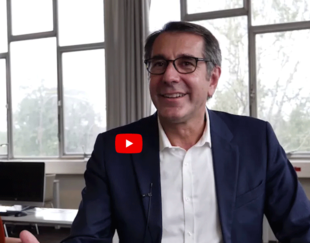
François Collin, Directeur de la stratégie climat et environnement d’HEC Paris témoigne de la prise de conscience sur les urgences de l'écologie, du climat et de la biodiversité. Il réagit à l'appel des...
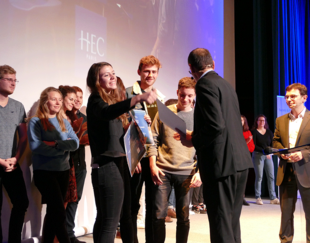
Sodexo CEO Denis Machuel helped bring down the curtain on the three-month freshman course in a closing ceremony featuring 381 students, 18 tutors and a top academic team from the S&O Center. The event...
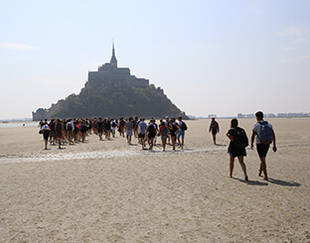
A year after creating the Joly Family Endowed Chair in Purposeful Leadership, HEC Paris launches its three-year sense and leadership program, destined for the entire HEC Grande Ecole 2019 intake. A...
